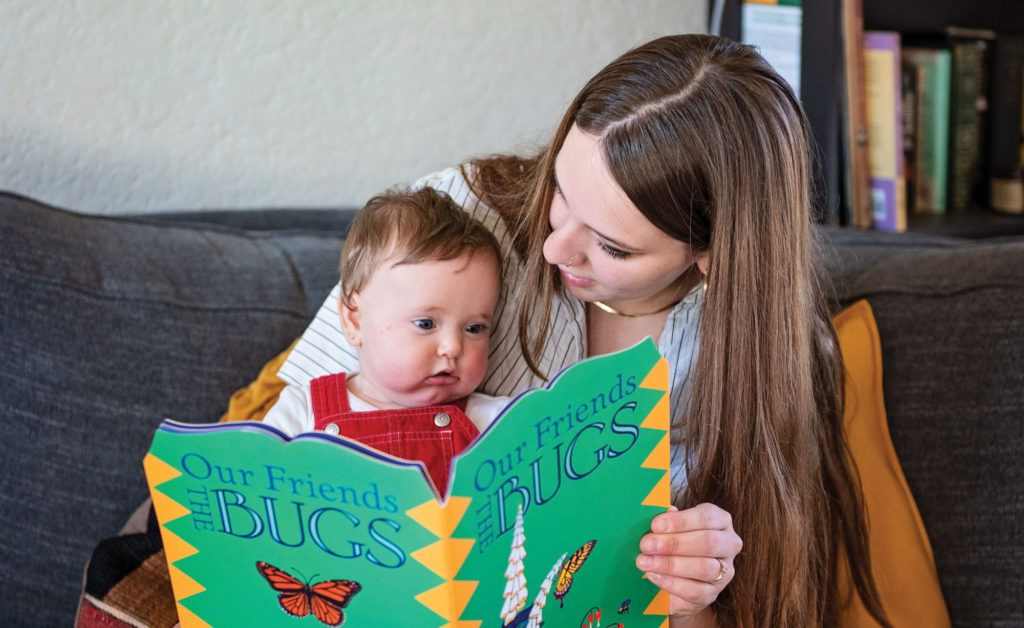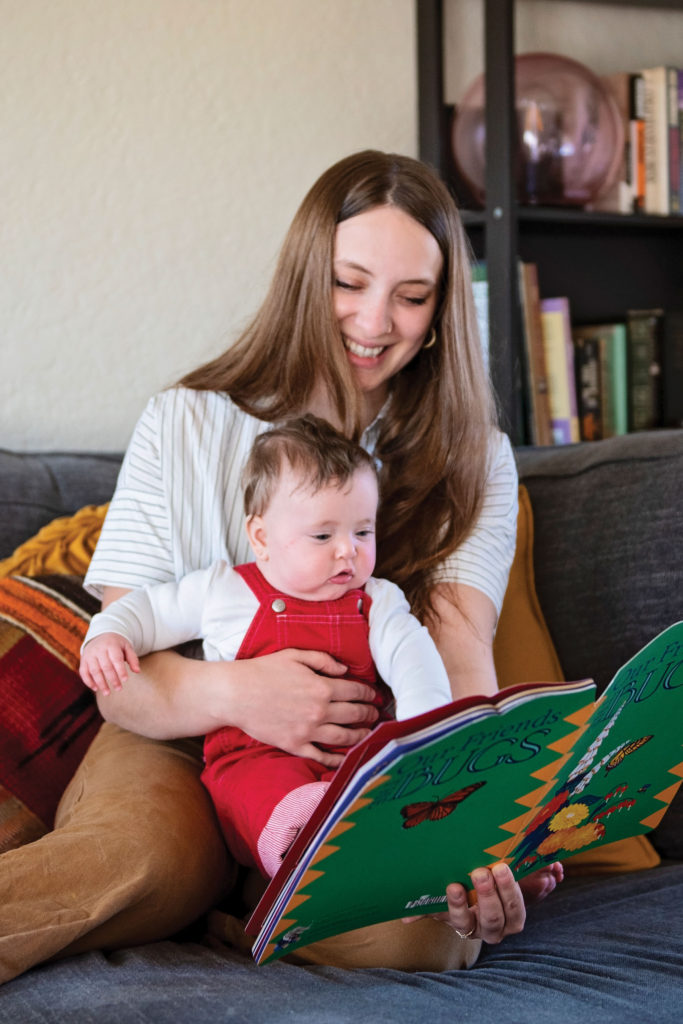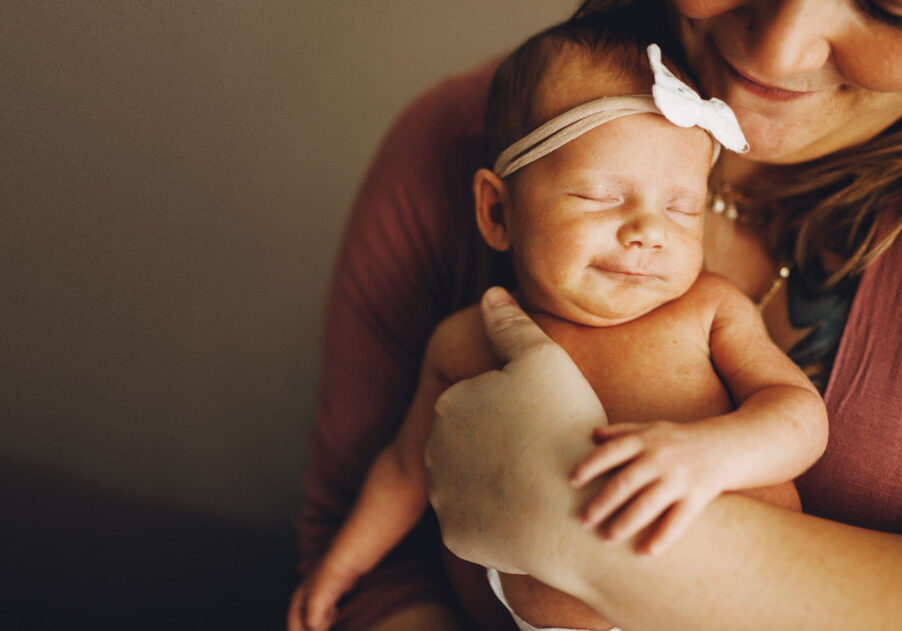Reading to your baby not only strengthens the parent-child bond; it is also a soothing experience and one which increases the chances that you carry on with this habit as your child grows older.
Several studies have found that the earlier you read to your child, the better it will be for their language development. This is because the more often your child hears new and different words, the more they learn.
It’s also important to keep in mind your child’s stage of development when choosing what books to read to them. Use these tips to guide your choice of appropriate books for your baby.
Reading to babies from newborn to six months
Just as babies learn to see over time, their ability to focus also develops over time. While they prefer to look at human faces at first, they rapidly begin to distinguish black, white, and colorful images. By three months, your baby begins to recognize a few familiar objects, such as her bottle.
Newborns will not understand what they are hearing, so reading at this stage is more for bonding purposes or as a means to sooth your child. At this tender age, your child is more interested in the experience than in the story, so what really counts is your calm voice and your presence. For babies this young, reading anything aloud, from books to a magazine to the back of the cereal box, is beneficial.
From about month four, your child will begin to look forward to your reading routine and to express excitement when it’s reading time. Follow your baby’s cue at this age. If he seems uninterested in reading, let it go and try again later, or try simply talking or singing. Your baby will love listening to your familiar voice.
 Reading to babies six to nine months old
Reading to babies six to nine months old
By six months, your child will begin to show a normal interest in touching and handling the books by herself. This is when babies begin to develop their hand-eye coordination, and most babies’ eyesight is also well developed by six months. At this age, your child will appreciate books that he can feel, touch and explore. Books with different textures, simple pop-up books, cloth books and books with highly contrasting colors are all good choices.
Books for babies nine months and older
Babies begin to understand a few words at around age nine months. They may also begin to show their capacity to absorb information by appearing to recognize certain words and stories. Board books, books that are highly repetitive, such as books with rhymes, and picture books are great choices for babies at this age. It is also at this age that they will love looking at pictures of other babies or pictures of familiar objects, so take advantage and show them images of babies portraying different emotions or reacting to different situations!
Tips for a happy reading routine
No matter the age at which you start your baby’s reading routine, there are a few general tips to help make this a happy time for everyone.
Keep it simple
Choose books with bright colors, sharp contrasts (in either black and white or bright colors) and large, simple images. Books with few images per page are the best choice for babies. The fewer the images per page, the better it is for your baby’s development. Books with one image against a contrasting background are great options at this age.
Your baby’s language skills develop by hearing the same words over and over again, so books that have a lot of repetition or rhymes help language development. So does reading the same books or stories over and over.
Books your child can manipulate are great options for babies. Flap books and touch and feel books help your baby develop visual and fine motor skills.
Make sure to choose books that will last through a good amount of throwing, chewing and pulling. And keep in mind that younger babies will find it easier to handle small books. As your baby grows, larger books are good choices.
It’s never too early to start reading to your child; and if you’ve missed those early months, remember that it is never too late to begin a reading routine. With a little experimenting, you can find a comfortable reading routine that will make your bonds stronger.
Posted in: Environment, Health & Nutrition
Comment Policy: All viewpoints are welcome, but comments should remain relevant. Personal attacks, profanity, and aggressive behavior are not allowed. No spam, advertising, or promoting of products/services. Please, only use your real name and limit the amount of links submitted in your comment.
You Might Also Like...

How To Support a Friend Through Divorce
The first time I attended the wedding of a friend, I knew exactly what to do. I brought a gift, set it on the gift table, and sat on the […]

Emotional Benefits Of Pet Dogs For Kids
Dogs have long been celebrated as “man’s best friend.” Not only are they adorable, friendly, and fun to play with, they also provide incredible emotional benefits. Many people feel happier […]

Managing Yourself in Time
One of my mentors, Bill Truby, taught me the following: “We don’t need to learn time management because we simply can’t manage time.” He said, “The reality is that there […]

Stress Management Toolkit
How to Make A “Five Senses” Stress-Busting Toolkit for Your Kids We are all facing uncharted waters with the coronavirus disease, COVID-19. Everyone’s anxiety is sky high worrying about everything […]





